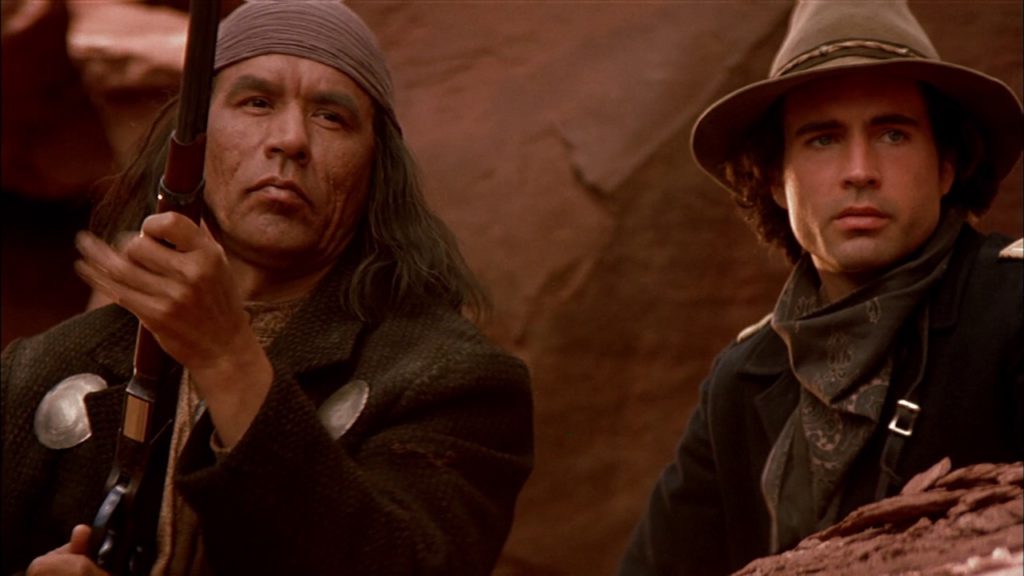Geronimo: An American Legend (1993)
CAST: Jason Patric, Robert Duvall, Gene Hackman, Wes Studi, Matt Damon, Rodney A. Grant, Kevin Tighe
REVIEW:
While its title might be simply Geronimo, a more accurate name for this movie might be The Geronimo Campaign. Walter Hill, not a stranger to the Western genre, directs this chronicle of the “Geronimo Campaign” in which famed Apache war leader Geronimo, with 34 men, managed to elude 5,000 US cavalry troops between 1885 and 1886 before his surrender in September 1886.
Our entry point into the story is young fresh-faced Lt. Briton Davis (Matt Damon), who’s come straight from West Point to Arizona to serve under Lt. Charles Gatewood (Jason Patric). After decades of warfare, the Apache tribe has finally submitted to US military authority and settled on a reservation under army supervision. But not all of the Apache are so resigned to their fate, especially the famed warrior Geronimo (Wes Studi), and when the military’s heavy-handed methods push the Apache over the edge, Geronimo returns to the war path. General George Crook (Gene Hackman) dispatches the cavalry in pursuit, including Davis, Gatewood, and scout and Indian hunter Al Sieber (Robert Duvall).
One senses there’s something a little “off” when the movie is called Geronimo, but the actor playing Geronimo, Wes Studi, is fourth-billed behind Jason Patric, Robert Duvall, and Gene Hackman. In fact, despite coming in behind Studi at the bottom of the principal cast, it’s young unknown Matt Damon’s Lt. Briton Davis who provides our primary viewpoint character, as evidenced by his overly expositional running narration (like many overly chatty narrations like this, it spends too much time telling things without showing them, or explaining things we could glean from the scenes themselves). This is somewhat justified by the real Davis’ journal providing source material for the script, but some will no doubt take issue with a movie titled Geronimo that’s primarily from the perspective of white military officers.
While the white-centric aspect rankles, Geronimo at least paints in shades of gray. It acknowledges brutal acts on the part of both Geronimo’s renegades and the US military, and of the white characters, all but the mustache-twirling General Nelson Miles (Kevin Tighe) have some level of respect for Geronimo even as they’re pursuing him. Gatewood is torn between sense of duty and his sympathy and admiration for the Apache (the son and younger brother of Confederate soldiers, “I too know what it is to hate the bluecoat”), feelings his protege of sorts Lt. Davis comes to share, and even the gung-ho Indian hunter Al Sieber regards the Apache with at least grudging respect. General Crook staunchly enforces US government policy of forcing the Apache onto reservations in hopes they will adapt to a farming lifestyle, but less out of malice than because he sees it as their only hope for survival in a world that’s left their old ways behind. For his part, despite being on opposite sides, Geronimo has an amicable relationship with Gatewood, strictly keeps his word (on the rare occasion he gives it), and can be thoughtful, philosophical, and willing to negotiate. But the old warrior ways are still in him, and one senses his brief time farming on the reservation is spent itching to get back into the action.
While Jason Patric, Matt Damon, and reliable veterans Robert Duvall and Gene Hackman are all adequate in their not particularly challenging roles (Duvall is in his patented crusty old cowboy mode), the most arresting presence in the movie is the man with the title role, Wes Studi, even if he’s not afforded central focus. Studi, who played the fearsome villain Magua in last year’s The Last of the Mohicans, is more subdued here but still has a commanding presence and brings a fierce nobility to Geronimo, who possesses a harsh but strict honor code. Rodney A. Grant, who along with Studi appeared in Dances With Wolves, tags along as one of Geronimo’s warriors. The only real “villain” is in the fairly small role of Kevin Tighe’s General Miles, who with his rumbling growl and broody glower might as well have “bad guy” stitched on his uniform.
Geronimo is handsomely-filmed (cinematographer Lloyd Ahern captures picturesque shots of red-painted cliffs and wide open spaces) and Hill executes several action sequences (including an opening raid on an Apache stronghold, Geronimo’s breakout from the reservation, a one-on-one duel between Gatewood and an Apache warrior, and a shootout in a bar with a gang of bounty hunters), but this isn’t really an action movie, and unfolds at a leisurely pace. Along the way, Hill and screenwriter John Milius make plenty of commentary on the cruel treatment of Native Americans under the US government and military (especially egregious is the historically accurate depiction of how General Miles violated the terms of Geronimo’s final surrender, not allowing the Apache renegades to return to their native lands as had been agreed, and even dismissing and arresting the Chiricahua scouts who had faithfully served the Army). The film’s account of events is generally historically accurate, although one character’s fate has been fictionalized (for more dramatic effect and a dash of extra action, I guess). It’s worth noting that, despite some criticism for its white-centric perspective and primarily showing the title character through the eyes of the white army characters rather than more central focus on Geronimo himself, the film also received some praise from Native American organizations for its general historical accuracy and its sympathetic and accurate depiction of the Apache.
At the bottom line, Geronimo is a well-made, mostly faithful historical drama which, along with the recent Dances With Wolves, helps to shed a little more light on an unsavory aspect of American history, but one can’t escape the feeling that there could be a substantially different movie made from a different perspective of the same material.
* * *
